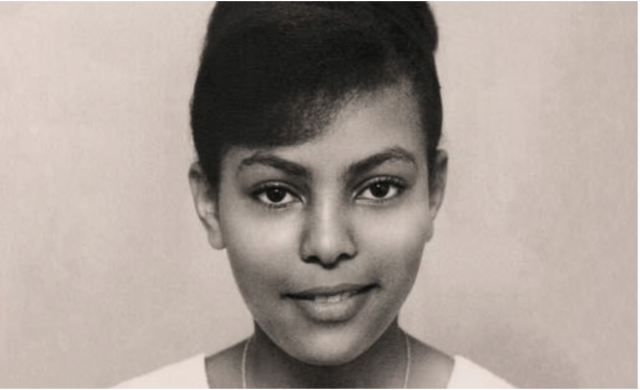 Finding Sally, a new documentary film by Tamara Mariam Dawit screens on Hot Docs at Home on CBC on April 30th, 2020. (Courtesy photo)
Finding Sally, a new documentary film by Tamara Mariam Dawit screens on Hot Docs at Home on CBC on April 30th, 2020. (Courtesy photo)
Tadias Magazine
By Tadias Staff
Updated: April 16th, 2020
New York (TADIAS) — An Ethiopian documentary film Finding Sally is set to make its world premiere on April 30th in a newly created TV platform called ‘Hot Docs at Home on CBC,’ which was launched in Canada as the coronavirus pandemic caused the cancelation of film festivals around the world.
In Finding Sally the filmmaker Tamara Mariam Dawit tells the moving story of her long-lost aunt, Selamawit (Sally), who turned from a fun-loving college student in Canada in the 1970s into one of the most wanted opposition activists in Ethiopia.
Tamara herself — who was born and raised in Canada but now lives and works in Ethiopia — had not heard of Sally until later in her life.
Below is our full Q&A with Filmmaker Tamara Mariam Dawit:

Tamara Mariam Dawit. (Courtesy photo)
TADIAS: Congratulations on the upcoming World Premiere of Finding Sally. Please tell our readers about the film and the inspiration behind it.
Tamara Mariam Dawit: The film tracks my personal investigation into the life of my aunt Selamawit (Sally), an Ethiopian aristocrat-turned-communist-rebel who disappeared during the Ethiopian Revolution.
The film poses the question that arises when someone you love disappears without a trace: how do you cope? It explores not only how my family has managed this loss, but also how the entire country has managed the loss, pain, and trauma of the Red Terror. My family is just a small example of how many Ethiopians are still dealing with those deaths, and how the fear of public mourning under the military government forced so many people to suffer in silence.
My aunt Sally and many of her peers lost their lives fighting for what they believed could be a better Ethiopia. They envisioned a united and democratic Ethiopia that would embrace everyone equally – something I think is still possible despite the dangerous ethnic divisions that plague Ethiopia today. I hope that Finding Sally can be a plea for freedom of speech and critical thinking, and also an indictment of silence in general in Ethiopia. I hope that this film can be a catalyst to discussing the country’s past and engaging in critical discourse about the road ahead.
TADIAS: In your media statement you mentioned that you were in your thirties when you first saw the photo of your aunt Selamawit (Sally). How did you discover the picture? Can you give our readers the historical context of why her story remained a family secret for so many years?
Tamara: I first found out about Sally nearly ten years ago when I was visiting my grandmother’s house in Addis Ababa. My grandmother was displaying a new photo on the mantel above her fireplace of a beautiful woman who was unfamiliar to me. This was Sally and it was the first time I had seen an image of Sally. It took some time before my grandmother and the rest of my family started to feel comfortable to talk to me about who Sally was and the ultimate result of that is this film.
I think that the main reason I didn’t know about Sally was because remembering her or talking about her has always been very painful for my family. Many Ethiopians and Eritreans lost relatives during the Red Terror and there are many painful and personal experiences that we don’t talk about. I asked my grandmother if she would be OK with me making a film about Sally’s life. She was supportive of this because she realized younger generations like me had no knowledge about Sally and her peers, what they had stood for and had done. She wanted Sally and her vision of a better and more just Ethiopia to be remembered. She wanted young Ethiopians today to be able to learn from their past.
TADIAS: A daughter of a diplomat (your grandfather), Sally had transformed herself from a young, vibrant and outgoing university student in Canada during the 1970s into an underground political activist in Ethiopia. In the course of your research what are some of the most surprising things you learned about your aunt as well as your family and Ethiopia in general?
Tamara: I think the main thing that I learned in researching Sally’s life is that everyone was telling me their own version of Sally and of her life – the version that they themselves where comfortable with remembering. I think the most interesting thing I learned about was how incredibly brave Sally was, not only to take up arms for a cause she believed in but also to use her voice to speak up on behalf of women in Ethiopia. One specific incident I learned about was when Sally was invited to give a speech to a group of graduating women’s group in Akaki just outside of Addis Ababa. Rather than stick to safe content Sally gave a speech where she literally told the Derg off. It was after this that she had to go into hiding and cut off contact with her family. I also learned that she had used my Grandmother’s VW Beetle as the getaway car when she was involved in an assassination attempt on Mengistu Haile Mariam.
TADIAS: In many respects Sally’s story is that of a generation of Ethiopians. As you note her story ‘unfolds alongside that of The Red Terror.’ Was the filmmaking process at all a healing experience? Did it bring closure for your family?
Tamara: I hope that the film was a healing process for my family. It certainly caused everyone to reflect and spend time together talking about Sally. Something they admitted they hadn’t done as a group since her death. I also think that there are many Sallys in Ethiopia and Eritrea, and I hope that this film sparks more conversations and thus healing in households across the Diaspora.
TADIAS: It took you about eight years to finish making the film. What was your overall experience like? What is your advice to aspiring independent filmmakers?
Tamara: Making any film is certainly a labor of love and a slow process. But it took a long time also because I spent years researching about Sally, the Red Terror, Ethiopian History, the EPRP before even starting to film anything. It is also incredibly challenging to finance African stories. I was very lucky due to Sally and my family having lived in Canada to have been able to have the film produced and financed in Canada. I do film training programs in Addis and it is also a challenge to get filmmakers interested in making docs. I hope that when we screen Finding Sally in Ethiopia it may inspire more filmmakers to try out the format.
TADIAS: Finding Sally is set to make its world premier on Hot Docs at Home on CBC on April 30th. Can you tell us about the new platform, which was launched recently as a special TV series in response to the coronavirus pandemic? How can people view the film and what are your future plans in terms of screenings specifically for the Ethiopian Diaspora audiences?
Tamara: The opportunity to air the film on CBC occurred because of the impact of COVID and the general inability to host festival screenings. This is a great partnership between Hot Docs and the CBC to help promote the films to audiences in Canada. Viewers will be able to watch the film on CBC, CBC Doc Channel or CBC GEM. The current viewing is just in Canada, but once it is safe to gather again then we will be able to rebook some festival screenings and also arrange community screenings for the Ethiopian and Eritrean Diaspora. Those are the screenings and discussions that I am most interested in. We will also air an Amharic version of the film in Ethiopia in the future.
TADIAS: Is there anything else that you would like to share with our readers?
Tamara: One of my main motivations for starting to direct was a frustration in watching films about Ethiopia at festivals or on TV that were not made by Ethiopians and where most of those speaking about Ethiopia where also westerners. These films had a western gaze. In contrast, this film is from my point of view as a daughter of Ethiopia, as a member of the Diaspora who has moved back. It is also specifically only from the point of view of women. I chose specifically not to interview any men for the film. As I found when researching about the Red Terror that most of the content was from the perspective of men. I wanted to make a space for women to talk about the past and future of Ethiopia.
TADIAS: Thank you again Tamara. We wish you all the best and much success with the film!
Tamara: Thank you
Watch: Finding Sally trailer:
—
If You Watch:
FINDING SALLY
World Broadcast Premiere
HOT DOCS AT HOME ON CBC
Thursday, April 30, 2020
CBC and GEM, 8:00pm (8:30 NT) and documentary Channel, 9:00pm ET/PT
More info at www.findingsally.com
Join the conversation on Twitter and Facebook.

























